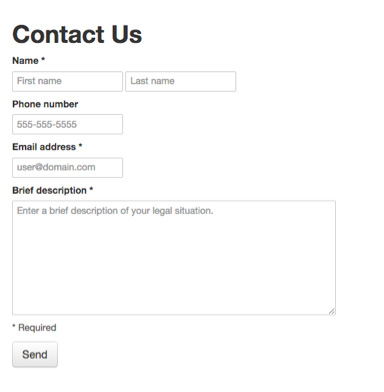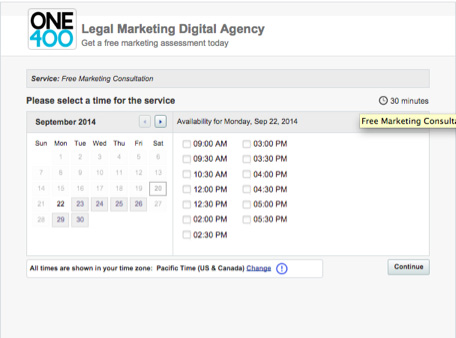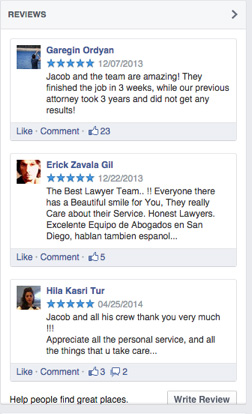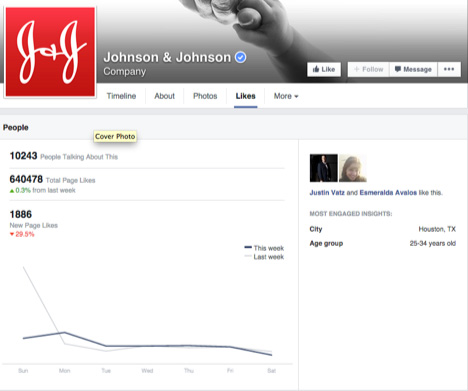 There are so many articles and presentations out there on the topic of social media for lawyers. However, most of the content you come across is about how to create a Facebook Business Page. I am going to assume that you can figure this out on your own or have read a tutorial on it already.
There are so many articles and presentations out there on the topic of social media for lawyers. However, most of the content you come across is about how to create a Facebook Business Page. I am going to assume that you can figure this out on your own or have read a tutorial on it already.
What is really important to understand is how Facebook can help your law firm. If used appropriately Facebook can be extremely valuable to attorneys. Facebook is valuable if it increases brand awareness and leads to the acquisition of clients. As a lawyer, any marketing activity you do that doesn’t fall into one of those 2 categories, you should immediately stop doing.
There are 802 million people that go on Facebook every day. 802 million. Let that sink in. No matter what networking group or bar association you are a part of, you will never be able to reach that many people offline.
Given this statistic, 64% of top 50 law firms have a Facebook page. However, very few are using it optimally. (If you think your firm is, I’d love to hear from you at eva@one-400.com so I can add you as a model example to this post.)
Below are tips on how to maximize Facebook’s value
*Value here means brand awareness or client acquisition. All of your marketing activities should have these outcomes in mind and if they fail to deliver these results you should stop wasting time and money on them.
1) Use high quality images
Facebook is a very visual platform. Whenever you are posting blog posts or articles on your company page, you should always make sure to have an aesthetically pleasing and relevant picture (non stock is obviously preferable but understandably more expensive) to accompany the content.
2) Think about recruiting
Facebook is the perfect platform to promote your brand to prospective summer associates or associates. Posting pictures of team outings and Christmas parties is a great way to target future recruits. 27% of Facebook users are ages 27-35 so engaging this demographic should also be taken into consideration if you predict growing your firm in the near future.
3) Humanize your practice
So many law firms use Facebook just to push out law firm news and their attorneys’ articles. Although it is important to show the expertise of your firm and its attorneys, you can also distinguish yourself and your firm by showing that there are real people behind the firm. In consumer facing practice areas, most people aren’t able to judge you based on your legal skills. What they look for is that they connect with you on a personal level, trust you and believe that you will do everything you can to advocate on your behalf. Translate this in person experience online by posting pictures of you and your team doing something other than sitting at your desks. If you like golf or tennis or enjoy coaching your son’s soccer team, post some pictures of that because it shows that you are approachable, a family man and personable.
4) Add Apps
*Some of these are custom (which means you need a developer to build them in HTML) but most are offered by third parties.
Apps are usually located in the tabs section of the page right below the large header image. All of the apps below serve to engage your followers and visitors.
Contact Feature

Newsletter

Send a voicemail

Appointment Setter App

Reviews

Events

5) Mix of content
You want to make sure you have a good mix of content ranging from firm news to practice area industry trends. As mentioned before, try to alternate between posts that show off your legal expertise, posts that keep people updated on the industry trends and more lighthearted posts that have less to do with the law and more to do with the people that make up your law firm. Sometimes even profiling a new attorney that recently joined the firm can a good way to cut through all the more serious content. What about an interview of the CEO of one of your clients regarding the state of his industry and his projections. This makes for interesting content. You can even go a step further and add a discussion prompt like “What do you think about the future of the XYZ industry?”
Many lawyers are scared of Facebook because not only is the legal industry is inherently a regulated industry, it also has strict rules around attorney advertising and solicitation. The fact that there are rules that govern social media does not mean you should avoid social media. It means that you should consult your states’ rules of professional responsibility and any opinions regarding social media in order to become knowledgeable about what is allowed and what isn’t. After all, isn’t this the very bedrock of being a lawyer, knowing what is allowed and what isn’t?
With regards to content, what you need to evaluate is whether the content is a communication under your states’ Model Rules of Professional Responsibility. In California, a communication is something that concerns your availability for professional employment. If so, you must follow the Rule 1-400 and abide by its stipulations, including disclosing that it is an ad, that nothing on the page guarantees similar outcomes, no false or misleading statements. It is best to preemptively put all necessary disclaimers on your Facebook page, something like “Nothing viewed on my Facebook page serves as legal advice. Contacting me does not form an attorney client relationship. To view the full disclaimer please go to my website. Please refrain from putting any confidential information or false statements on my Facebook page.”
6) Engage with your audience
“Only 2 firms have publicly responded to comments on social networks.” (3) This is quite a harsh statistic given that 64% of top law firms are on Facebook. A big advantage of using Facebook is that you are able to have a two way conversation. Don’t misinterpret what I am saying here. I am absolutely not suggesting you engage in a real time conversation over Facebook Messenger with a prospective client regarding his case details nor am I suggesting that you should respond to negative reviews with revenge, as these would be violations of the Model Rules of Professional Responsibility (Please consult your states
rules regarding advertising and solicitation). However there are tactful ways to engage with your audience. For example, let’s say someone leaves you a complimentary and true and accurate review (emphasis on true and accurate here!), it might be nice for you to thank them. Again careful here. In order to avoid any problems, I would refrain from using their name, “Thank you for the kind review.” If you want to use their name and tag them in your response, best to ask the client if it is okay before doing so.
7) Encourage employees to join and make it easy for clients, previous clients and friends of the firm to join
Encourage employees to join by getting them excited about your brand. I understand that liking a law firm company page does not have the same appeal as liking the Coca Cola or Oreos page, but both you and your team should be proud of your firm and should be willing to do what it takes to grow the business. You can encourage employees to join by giving them opportunities to contribute to the Facebook page, either with pictures or content. To spark interest and also to protect your reputation, it is best to create a social media guidelines document to share with the entire firm so that everyone understands what is/isn’t kosher to post.
One way to increase your likes, is to imbed the facebook icon on your website, include a mention of it in your newsletter and best of all put it in your signature block. By doing the later, each time you send an email, clients will see a link to your Facebook and I have seen this to be quite a successful tactic for some attorneys. Don’t ever force clients or prospective clients to join your Facebook and be cautious of providing something of value for liking your page or providing a positive review.
Another tactic to stay clear of, while effective, is buying likes. This is something I look down on and caution against. The best way to build a following is with high quality content and constant engagement, not money. This is also questionably ethical although it hasn’t been addressed yet (to my knowledge). One way you can tell if someone bought likes is to look at their likes tab. If 2 people are talking about them and they have 100,000 likes, it is quite possible (though not 100%) that they purchased the likes given the disconnect. You can also tell by looking at Most engaged insights by city. If that city is in India, it tells you that the attorney or law firm has bought his likes since no one in India would be liking a San Francisco’s Personal Injury Attorney’s page. As an example, I have included J&J’s company page which has a pretty good “people talking about this” to “likes” ratio.

8) Best time to post
You should aim to find out when the best time to post is for your given audience. Best practice is usually said to be between 1-3pm on Thursdays and Fridays.
9) Post consistently
The worst is a stagnant Facebook Company Page. If you commit to start a Facebook Company Page, you also have to commit to posting at least once a week, more if you can.
10) Evolving Platform
I suggest that lawyers get on the Facebook bandwagon and embrace it. It is a phenomenon that will only grow and continue to adapt. As a result, the Model Rules will adapt and begin to embrace social media as a whole. For example, Australia and Canada and other countries now allow court notices to be served on Facebook, some countries as early as 2008. And two courts in the United States also just permitted service via Facebook. My suggestion is to always familiarize yourself with the newest technologies and trends so that you can always stay one step ahead of the competition.
Sources
(1) http://digitalcommons.tourolaw.edu/cgi/viewcontent.cgi?article=1138&context=lawreview
(2) http://ethics.calbar.ca.gov/Portals/9/documents/Opinions/CAL%202012-186%20%2812-21-12%29.pdf
(3) http://thesocialmediamonthly.com/social-law-firm-index-law-50-firms-really-engaged-clients/
(4) https://zephoria.com/social-media/top-15-valuable-facebook-statistics/
(5) http://www.jeffbullas.com/2010/07/31/30-fascinating-facebook-facts-to-tell-your-friends/#zqjdC0HXuf6CXjco.99
All opinions, advice, and experiences of guest bloggers/columnists are those of the author and do not necessarily reflect the opinions, practices or experiences of Solo Practice University®.






















There are a few things within this article that are not 100% accurate or missing from the post.
1) Understanding commercial speech versus content. This article references California’s ruling with regards to communication on social channels that falls under Rule 1-400 (advertising and solicitation). If you dive deeper into the issue of posting on social channels, and if that does or does not fall under your state’s solicitation rules, it becomes clear that just posting on social media does not in fact fall under the guidelines of advertising if that post is devoid of commercial speech. If your post is useful content or a link to an article that is relevant content without commercial speech (including commercial speech on the landing page of the content you share) you do not need to worry about solicitation rules.
2) Brand engagement within Facebook is continuing to plummet. There is one major piece missing from this article…you have to be paying for Facebook promoted posts if you expect Facebook to work for a law firm. These ads need to be extremely target, you will need psychographics of your intended audience, and a budget of $5 – $100 per post. Without paying you can expect a low single digit percentage of engagement. That is not even worth your time.
Jabez
Hi Jabez,
Thank you for your comments. With regards to 1, you are correct. The main point of the article was really to give some practical tips to lawyers on how to use Facebook in the most efficient way. WIth regards to 2, I chose not to address paid advertising in my post. Yes of course you can purchase Facebook ads to increase engagement with your company page. I actually think there are various ways to increase engagement with your Facebook page that require effort not money. I tried to address some of these different approaches in my article. Several lawyers I know have acquired clients from having a Facebook page. I think the ROI on Facebook really boils down to how much time and effort you are willing to commit to building a following on Facebook.
Cheers
Eva
I agree Eva,
Talking about Facebook marketing is less than 10,000 words is going to be difficult. Good post, just thought those two things were important enough to point out.
Take care,
Jabez
I think FB firm pages are overrated and they are only good because you need to have one so you can do paid targeted Facebook Dark Posts. For me and my brand, pushing out useful and engaging content on my personal page is more effective than I believe a firm page would be. A better strategy is to draft timely articles for local popular blogs, such as “How to Handle a DUI Better Than Michael Phelps.” Posts like that engage people. Like Jabez said above, you have to pay to engage as a business now on FB…I have to pay for those millions of people to see my stuff. The question is whether or not FB is worth the cost?
Whether or not it is ‘worth’ it is in the eye of the beholder. I know too many lawyers who not only recognize its value but profit from the presence as you can’t deny it is where people congregate. I don’t believe it is an either/or debate. It’s a question of how much does it really cost in time and dollars to engage? If there is an expectation from consumers that a lawyer should have a presence is that enough of a reason to repurpose some of your blog content and schedule a post once a week on your law firm page? If once every few weeks you spend $5 – $10 – $15 and get yourself 1k or so impressions and a click or two which generates traffic to your business site and possibly a potential client contact or even a conversion, you have to decide if you have the time or inclination to do so. In sales it takes an average of 7 ‘touches’ to generate inquiry/conversion. Yes, Facebook pulled a fast one trying to generate income by limiting reach. Yet, to this day even with the change in FB’s algorithm, when I post something that resonates with those who follow Solo Practice University’s Facebook Page, I still get an impressive reach. And it doesn’t cost me but a few clicks on the key board.
Hey Scott – nice to see you here.
I agree with Susan, it is not a matter of one over the other, it is a question of how involved you will be on Facebook. There is no reason to ignore the largest social network regardless of how successful other content strategies are.
Note – We have see content that performs really well on one medium and did not see the same results on other mediums. Think about the audience of the group and draft content, or versions of your own content, that best meet that group’s expectations.
Good convo here!
Good points Jabez. I don’t believe in cookie cutter approaches. The world is too vast, too many different buying personas, different watering holes, different needs. There are some rules which hold fast and true but then the sky is the limit. The key is having quality sherpas guide you through the wilderness if you are inclined to enlist them. Sometimes it can be worth it!